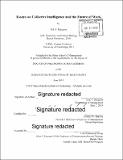Essays on collective intelligence and the future of work
Author(s)
Duhaime, Erik P.
Download1132264611-MIT.pdf (6.623Mb)
Other Contributors
Sloan School of Management.
Advisor
Thomas W. Malone.
Terms of use
Metadata
Show full item recordAbstract
This dissertation considers how information technologies have enabled new ways of organizing work. The first essay investigates how artificial intelligence (AI) systems will impact the field of medical diagnostics. While previous research has shown that Al can diagnose skin cancer as accurately as professional dermatologists, I explore what happens when Al is combined with-rather than compared to-human intelligence. Using a dataset of the diagnoses of 1 state-of-the-art Al system and 21 board-certified dermatologists on 371 biopsy-proven cases of skin lesions, I find that averaging the opinion of an individual dermatologist with Al often does not lead to higher accuracy than Al alone. However, combining Al with the average opinion from groups of dermatologists leads to higher performance than individuals alone, Al alone, and groups alone. This suggests that in many cases artificial intelligence will not simply replace jobs, but rather, will transform how work is organized. The second essay (coauthored with B. Bond, Q. Yang, P. de Boer, and T.W. Malone) considers how crowdsourcing can be used to find innovative solutions to complex problems. In past research, recursive incentive schemes have shown promise for conducting social search by motivating people to use their weak ties to find distant targets, such as specific people or even weather balloons placed at undisclosed locations. We report on a case study of a similar recursive incentive scheme for finding innovative ideas. Specifically, we implemented a competition to reward individual(s) who helped refer Grand Prize winner(s) in MIT's Climate CoLab, an open innovation platform for addressing global climate change. Using data on over 78,000 CoLab members and over 36,000 people from over 100 countries who engaged with the referral contest, we find that people who are referred using this method are more likely than others both to submit proposals and to submit high quality proposals. Furthermore, we find suggestive evidence that among the contributors referred via the contest, those who had more than one degree of separation from a pre-existing CoLab member were more likely to submit high quality proposals. Thus, the results from this case study are consistent with the theory that people from distant networks are more likely to provide innovative solutions to complex problems. The third essay (coauthored with Z. Woessner) considers how newly enabled organizational designs are changing the social norms and expectations of workers. Specifically, we investigate the social norm of tipping and propose that work in the "gig economy" is associated with a breakdown of tipping norms in part because of workers' increased autonomy in terms of deciding when and whether to work. We present four studies to support our hypothesis: a survey vignette experiment with workers on Amazon Mechanical Turk (Study 1), an analysis of New York City taxi data (Study 2), a field experiment with restaurant employee food delivery drivers (Study 3), and a field experiment with gig-worker food delivery drivers (Study 4). In Studies 1 and 2, we find that consumers are less likely to tip when workers have autonomy in deciding whether to complete a task. In Study 3, we find that restaurant delivery employees notice upfront tips (or lack thereof) and alter their service as a result. In contrast, in Study 4, we find that gig-workers who agree to complete a delivery for a fixed amount that includes an upfront tip (or lack thereof) are not responsive to tips. Together, these findings suggest that the gig economy has not only transformed employee-employer relationships, but has also altered the norms and expectations of consumers and workers.
Description
Thesis: Ph. D., Massachusetts Institute of Technology, Sloan School of Management, 2019 Cataloged from PDF version of thesis. Includes bibliographical references.
Date issued
2019Department
Sloan School of ManagementPublisher
Massachusetts Institute of Technology
Keywords
Sloan School of Management.